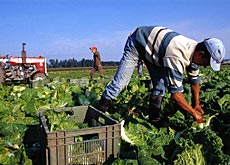
Groups want better protection for farm workers

Farming, labour and consumer associations are calling for national standards to prevent farm workers from being exploited.
An alliance of 16 organisations says it wants to ensure that consumers buy food that is produced under socially and environmentally acceptable conditions.
“We want to improve conditions for farm labourers,” said Willy Streckeisen of the European Committee for the Defence of Refugees and Immigrants on Monday in Bern.
There are more than 40,000 agricultural workers in Switzerland, most of them migrants. Up to 5,000 labourers are believed to work illegally in the farming sector.
Under Switzerland’s federal system, it is the cantons and not the government that monitor working conditions for farm labourers.
According to a manifesto outlined by the various groups, working conditions should be defined by a national collective bargaining agreement or a standard contract. They also suggested setting a minimum wage.
Unia, Switzerland’s biggest union, warned that the sector was vulnerable to wage dumping, especially since Switzerland’s borders were opened to workers from European Union countries in June.
Farm workers in canton Geneva earn the highest minimum wage: around SFr3,040 ($2,652). Most other cantons stick with the Swiss Farmers’ Union recommendation of SFr2,850.
National standard
According to campaigners, farm labourers work 48 hours a week on average in canton Valais, but this figure climbs to 66 hours in canton Glarus. The average working week in the farming sector is more than 50 hours.
But the Swiss Farmers’ Union, which did not join the alliance, said it was not interested in a national standard.
“The contracts set out by the cantons guarantee proper working conditions,” explained spokesman Fritz Schober. “If these conditions are not fulfilled, a farmer could get into trouble with the authorities.”
Schober told swissinfo that a national bargaining agreement for farm labourers would also turn the union into an employers’ association. He said members were unlikely to choose this path.
The manifesto also addresses Switzerland’s biggest food distributors. Its authors are demanding that the same social and environmental norms be applied to both Swiss and foreign produce.
The alliance says it is especially concerned about working conditions for labourers in countries such as Spain.
swissinfo with agencies
There are over 40,000 farm labourers in Switzerland, most of them migrants.
More than 4,000 of these labourers are thought to work illegally.
Most cantons guarantee a minimum monthly wage of SFr2,850.
The average working week ranges from 48 to 66 hours depending on the canton.
The manifesto was signed by 16 organisations including:
Unia (labour union).
Bio Suisse, Bio-Forum, Uniterre, Small Farmers’ Association (agricultural associations).
Fédération romande des consommateurs, Swiss consumers’ association (consumer associations).
European Civic Forum, European Committee for the Defence of Refugees and Immigrants (migrant defence associations).

In compliance with the JTI standards
More: SWI swissinfo.ch certified by the Journalism Trust Initiative





























You can find an overview of ongoing debates with our journalists here . Please join us!
If you want to start a conversation about a topic raised in this article or want to report factual errors, email us at english@swissinfo.ch.